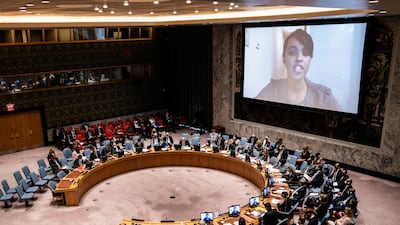Follow for live UN General Assembly coverage
US Secretary of State Antony Blinken has urged the UN Security Council to get more serious about climate change, warning that droughts, storms and other weather disasters were increasingly pushing countries into conflict.
Mr Blinken on Thursday said climate shocks had rendered swathes of the planet “less peaceful, less secure” and stoked the wars and instability currently affecting Syria, Mali, Yemen, South Sudan, Ethiopia and other regions “beset by strife”.
The top US diplomat said the 15-nation body had “unique powers” to tackle climate change, even as such members Russia, China and India resisted efforts this week to adopt a resolution linking climate change and global security.
“The climate crisis isn't coming. It's already here,” Mr Blinken said.
“Look at almost every place where you see threats to international peace and security today and you'll find that climate change is making things less peaceful, less secure, and rendering our response even more challenging.”
The high-level council session was part of the UN’s annual assembly, which has this year focussed on tackling the coronavirus pandemic and raising targets for cutting pollution and keeping global temperature rise under control.
It came ahead of the critical COP26 climate conference in Glasgow, which kicks off on October 31 and which aims to spark much more ambitious global climate action - and the money to pay for it - as scientists warn that global warming is spiralling out of control.
UN secretary general Antonio Guterres told the council that wildfires, flooding, droughts and other extreme weather events were affecting every continent and frequently “overlap with fragility and past or current conflicts”.
“In Somalia, more frequent and intense droughts and floods are undermining food security, increasing competition over scarce resources and exacerbating existing community tensions from which Shabaab benefits,” Mr Guterres said.
“In the Middle East and North Africa, which are among the world’s most water-stressed and climate-vulnerable regions, a major decline in precipitation and a rise in extreme weather events is harming water and food security.”
Micheal Martin, the Taoiseach or prime minister of Ireland, which holds the council’s rotating presidency this month, had pushed for a council resolution linking climate change and security, but members were still debating the text and an agreement was not likely this week.
Under the 2015 Paris Agreement, most world governments have pledged to keep global warming to “well below” 2°C above pre-industrial times and to strive to limit temperature rises to 1.5°C.
The planet has so far warmed by about 1.2°C and is headed for 2.7°C this century — raising the risk of wildfires, droughts, floods, hurricanes and other extreme weather that can drive conflicts over scarce natural resources.
There have been gains in climate change efforts during the UN’s annual jamboree.
US President Joe Biden pledged to double funds by 2024 to $11.4 billion per year to help poor countries tackle climate change, China said it would stop building coal-fuelled power stations abroad and Turkey announced plans to ratify the 2015 Paris climate deal.
Mr Guterres said he was “encouraged” by the pledges, but warned “we still have a long way to go to make” the COP26 a “success and ensure that it marks a turning point in our collective efforts to address the climate crisis”.
The charity Oxfam said this week that rich nations were still likely to fall up to $75bn short of fulfilling their pledge to raise $100bn each year from 2020 to 2025 to help vulnerable nations adapt to climate shocks.
“Millions of people from Senegal to Guatemala have already lost their homes, livelihoods and loved ones because of turbo-charged storms and chronic droughts,” the group’s climate chief Nafkote Dabi said.
“Wealthy nations must live up to their promise made twelve years ago and put their money where their mouths are.”


